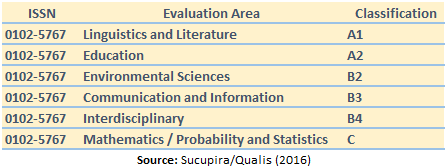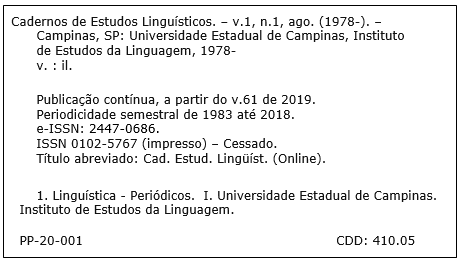Description
Cadernos de Estudos Linguísticos, founded in 1978, adopts the continuous publication system (rolling pass) and aims to disseminate scientific texts in the various areas of Linguistics. It intends to provide researchers with the publication of articles that present research results, academic reflections and analytical studies within different theoretical approaches. Thus, it is expected that the journal provide visibility to the development of the scientific agenda of the area, making works that provide a dialogue between different approaches and stimulate the exchange between researchers available.
Focus and Scope
Cadernos de Estudos Linguísticos has adopted the continuous publication system since 2019 (rolling pass) which integrates the same annual volume a section of articles that constitutes thematic dossiers and a section of articles of a general nature. The objective of Cadernos is to publish scientific texts in different areas of Linguistics in order to provide researchers with the publication of articles that present research results, academic reflections and analytical studies within different theoretical approaches. It is expected, therefore, to make available relevant works that provide dialogue between different approaches, give visibility to the scientific agenda of linguistic studies, debate issues relevant to the areas and encourage exchanges among researchers.
Peer Review Process
Texts submitted for publication in the journal are anonymously evaluated by two reviewers from the Editorial Board and/or ad hoc consultants. In case of discrepancies in the article evaluation, it will be evaluated by a third reviewer. Only works approved by the reviewers will be sent for publication, as long as the suggested modifications, if any, are made by the author.
After the preliminary formal review, the editorial board submits the work to the independent assessment of at least two reviewers (the “double-blind” method), whose areas of competence and academic training are related to the theme of the text. If there is a disagreement among the reviewers, the work must be sent to a third reviewer.
At the end of the process, the authors receive a communication regarding the opinions issued, guaranteeing the confidentiality of the referees.
There are three options:
- Acceptance of the article as submitted;
- Acceptance of the article after review suggested by the reviewers and;
- Refusal.
As stated above, Cadernos de Estudos Linguísticos works with the "blind evaluation", in which the evaluators do not identify the authors of the contributions and vice versa.
Frequency
From volume 61 (2019) onwards, Cadernos de Estudos Linguísticos adopts the continuous publication system (rolling pass), accelarating the publication of articles. There are no fascicles nor frequency as there used to be earlier. Thus, we publish the approved articles in multiple sets in one volume per year. The full summary and editorial board are published along with the last set of articles in the volume.
Estrato Qualis-CAPES / Qualis-CAPES Evaluation


Copyright Policy
The journal Cadernos de Estudos Linguísticos uses the Creative Commons (CC) license, thus preserving the integrity of the articles in an open access environment.
Open Access Policy
Cadernos de Estudos Linguísticos is an Open Access journal, which means that all content is available free of charge, at no cost to the user or his institution. Users can read, download, copy, distribute, print, search or link the full texts of the articles, or use them for any other legal purpose, without requesting prior permission from the editor or the author, as long as they respect the license to use the Creative Commons used by the journal. This definition of open access is in line with the Budapest Open Access Initiative (BOAI).
Archiving Policy
The Archiving Policy used by this journal is the LOCKSS system, developed by Stanford University, to create an archive distributed among participating libraries. The system allows these libraries to create permanent journal archives for preservation and restoration purposes. More information can be found at http://lockss.org.
This journal is also part of the IBICT’S Cariana Digital Preservation Services Network (Rede de Serviços de Preservação Digital Cariniana), which provides preservation for any journal of the Open Journal System[OJS] system in Brazil.
Lastly, the articles are preserved in the Library System of the University of Campinas.
The journal is also included in Editorial Policy Directories, such as Diadorim and Sherpa/RoMEO.
Similarity and Plagium Policy
As part of the actions to value academic integrity and prevent plagiarism of the publications in this website, Cadernos de Estudos Linguísticos adopts the text similarity identification service using the Turnitin platform implemented at the University since November 2016.
Crossmark Retraction Police
Ethics
Cadernos de Estudos Lingüísticos, a publication of the Institute of Philosophy and Human Sciences of UNICAMP, electronic ISSN 2447-0686, is dedicated to complying with good practices with regard to ethical conduct consistent with the scientific publishing of journals. The prevention of negligence is also a crucial responsibility of the editor and the editorial team: any form of unethical behavior, as well as plagiarism in any instance, is not accepted in Cadernos de Estudos Lingüísticos. E/A/ Authors who send articles to the Journal declare that their content is original and guarantee that the work has not been published or is under review/evaluation process in any other journal.
Source: Statement based on the journal Educação (UFSM).
Fees for text submission and publication
Cadernos de Estudos Linguísticos does not charge any fee (APC) to publish texts nor for the texts submitted for evaluation, review, publication, distribution or download. The publication is completely free and open access.
Sponsor
Journal history
Until volume 60 (2018), it was a triannual journal of Linguistics sponsored by the Department of Linguistics (DL) of the Instituto de Estudos da Linguagem (IEL) of the University of Campinas (UNICAMP). It is open to contributions on issues of scientific interest in any sub-area of Linguistics and in any of the following languages: Portuguese, English, French and Spanish. Its Editorial Board is composed of professors from the DL, but it also has many external members with relevance in the national and international scientific community. The submitted works are evaluated by members of the board and by ad hoc advisors. In addition to independent articles, the magazine considers proposals for the organization of monographic issues by researchers of recognized competence in the field of Linguistics for the intended number.

